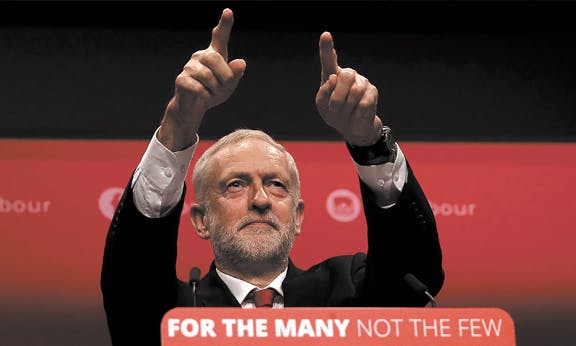Corbyn consolidates left turn in UK Labour

The British Labour Party’s annual conference, held in Brighton during the last week of September, was a remarkable event. Thousands of members took part over four days, buoyed by the astounding election result earlier this year. Attendance figures are not yet available, but it seems likely that it was a record.
The conference was a victory for the movement around Corbyn, further entrenching his faction’s political and institutional authority. Attendees lapped up shadow chancellor John McDonnell’s call to nationalise rail, energy, water and the postal service, and to end public-private partnerships. Union leaders called for wage rises, though a serious campaign will be needed, given that the Labour cabinet refuses to commit to a 5 percent per year target.
Corbyn was the star of the show. In a radical and wide-ranging speech – delayed for three minutes by chants of “Oh, Jeremy Corbyn!” – the Labour leader set out policies and positions that the left has been campaigning on for years.
He reiterated John McDonnell’s promise to invest more in public housing and introduce rent controls. He attacked US president Donald Trump as a racist and a warmonger, declaring that “the values we share [with the US] are not served by building walls, banning immigrants on the basis of religion, polluting the planet or pandering to racism”.
The speech contained a sustained and impassioned argument about the need for fundamental social change. “Grenfell stands for a failed and broken system, which Labour must and will replace”, he declared. He also promised “not simply to redistribute within a system that isn’t delivering for most people but to transform that system”.
Alongside the official proceedings, a conference was organised by Momentum, a left wing faction of the party. Although called a fringe event, the “World Transformed” festival was the focal point of a new left inspired by Corbyn’s vision. It held more than 300 sessions involving 5,000 overwhelmingly young people, including many who are not Labour members.
Topping it all off, recent polling shows Labour ahead of the Tories 43 to 39 percent.
These developments stand in contrast to what’s happening inside other social democratic parties across Europe, which are struggling with historic crises.
In recent elections in Spain and Germany, the social democrats received around 20 percent of the vote, their worst results since fascist dictatorships were overthrown in both countries. In France and the Netherlands, the centre left received an embarrassing 6 percent, while in Greece the discredited Pasok continues to languish at 8 percent, despite widespread demoralisation caused by Syriza’s betrayals.
The explanation for this divergence is simple – Corbyn is challenging the neoliberal orthodoxy that others have accepted or championed. Labour’s promise of a new society based on human need resonates with the generation raised in an era of austerity and bankers’ bonuses.
So great is the desire for change that even superficial and cynical attempts to emulate Corbyn – like that in New Zealand last month – can be rewarded with impressive boosts in opinion polls. Here, the ALP’s rediscovery of redistributive rhetoric has contributed to its lead in the polls.
But political parties are judged by deeds, not simply by their speeches and manifestos. This is why none of the pretenders enjoy the same popularity as Corbyn, who has an unimpeachable left wing and activist record.
It’s also why there is no room for complacency even in Britain; Corbyn and McDonnell must overcome hurdles before they’re able to win an election and implement their policies.
First is the opposition of the British establishment to any break from austerity. The media hysteria in the build-up to the last election will seem like a holiday compared to what is coming.
If enough people see through the media lies and elect a Corbyn government, opposition will increase to include economic sabotage by the banks and other sections of capital. While it is encouraging that this has been identified as a risk by McDonnell, there will also be opposition within the state.
The most destructive opposition to Corbyn will probably come from within the Labour party itself, which has yet to resolve the contradiction between its radicalising membership and conservative parliamentary caucus. The MPs vary, from right wing cretins such as Chuka Umunna to the supposedly ”hard left” Clive Lewis, but few share Corbyn’s rejection of austerity, racism and war.
The right wing of the British Labour Party expresses ruling class opinion today more than any other faction in parliament. It will never agree to implement left wing policies – unity with the right will come only on its terms. And any truce with the political centre would grant Corbyn’s enemies the time and space they need to regroup.
The tendency for the left to recoil from a fight is reflected in Corbyn’s refusal to endorse attempts to replace right wing MPs with more progressive candidates, and also in his concessions, especially around race and migration, to maintain party unity.
The left should view the weakness of the centre as an opportunity to crush the traitors and rebuild left wing organisations. Its success at the conference shows this is possible, but the process is far from complete.
Rebuilding serious movements and organisations on the radical left will be crucial to securing Corbyn’s hold over the party, opposing the Tory cuts that are coming thick and fast, and lending support to any future Labour government’s attempt to implement a left wing program.